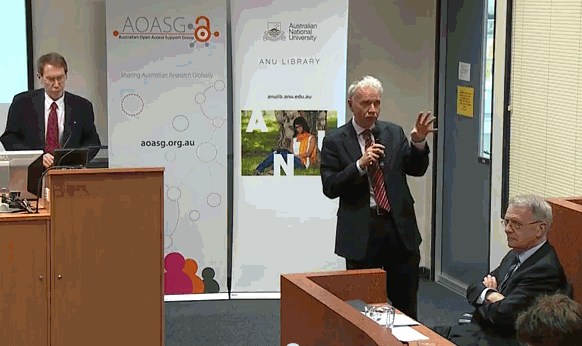|
|
|
|
|
|
|
News & Views item - October 2013 |
![]() An Expert Panel on the ARC & NHMRC's Open Access Policies Regarding Public
Funding Research. (October 21, 2013)
An Expert Panel on the ARC & NHMRC's Open Access Policies Regarding Public
Funding Research. (October 21, 2013)

Open access to research outcomes has become a hot topic in the past two years.
The two Australian government funding bodies, the Australian Research Council
(ARC) and the National Health & Medical Research Council (NHMRC), now have open
access policies. The Australian Open Access Support Group and The Australian
National University recently co-hosted an expert panel to discuss and explore
these policies.
The panel included Professor Aidan Byrne, CEO of the Australian Research Council, and Professor Warwick Anderson, CEO of the National Health and Medical Research Council, moderated by Professor Ian Young, Vice-Chancellor of The Australian National University.
The following material is supplied by them.
___________________________________________
The presentations covered the broader international open access landscape and how much this has changed in the past year. Both Professor Anderson and Professor Byrne discussed how, given the speed of change in scholarly communication, it is almost impossible to know what the open access agenda will look like in five years time. For this reason, neither the NHMRC nor the ARC wish to be prescriptive about how to implement their policies.
The presentations underlined that neither policy advocates a particular method of achieving open access, or specifically requires payment for open access. However, the NHMRC considers the cost of publishing journal articles a legitimate Direct Cost of Research, and the ARC is progressively removing the caps on the percentage of research funds that can be used for publication.
One of the questions that arose was the issue of monitoring compliance to the policies. Both organisations are working on the premise that as researchers make their work open access they will see the benefit of having work available. Professor Anderson noted the NHMRC’s Research Grant Management System now allows Chief Investigators to list publications linked to grants and these will be checked next year. While there are no current plans to withhold future grants from researchers that do not comply with the policies, this could become the case into the future.
More than one researcher noted the challenges with making creative works, or culturally sensitive research freely available. Professor Byrne reiterated that these were examples of why the ARC was not expecting 100% compliance to their policy.

Click on the image to access the video
(Note: 2:34 means 2 minutes and 34 seconds into the recording etc)
2:34 – Professor Anderson’s presentation on the NHMRC policy
20:24 – Professor Byrne’s presentation on the ARC policy
28:48 – Question session begins
28.54 – The first question referred to elements of image copyright in particular in the visual arts, given this is an area where people rely on the images for their livelihood
30:49 – The second person asked if there were particular things we should be doing in Australia to comply with the policies and whether we should be positioning ourselves in terms of the international context?
34:36 – This question referred to issues of monitoring compliance, and asked about the tagging proposal from CAUL for harvesting articles and where that proposal is going
40:00 – There was a statement about Australia being a leader in open access monographs
40:26 – A technical question followed about grant applications and asked how compliant researchers had to be in their applications
43:21 – This was a discussion about the dissemination of culturally sensitive research materials
46:36 – The question related to data, and noted that the policies have been shaped and informed by changed expectations of an open society but how have they been shaped and formed by processes in government to make data more open for the taxpayers?
49:01 – The question referred to the cost associated with publication, in particular when groups are disadvantaged because they do not have the resources to come up with the page charges to publish
57:40 – The final question asked about where the country is going in terms of major infrastructure for research